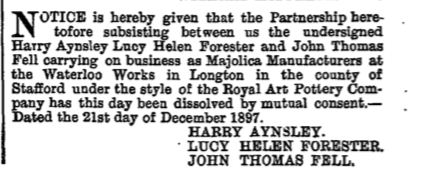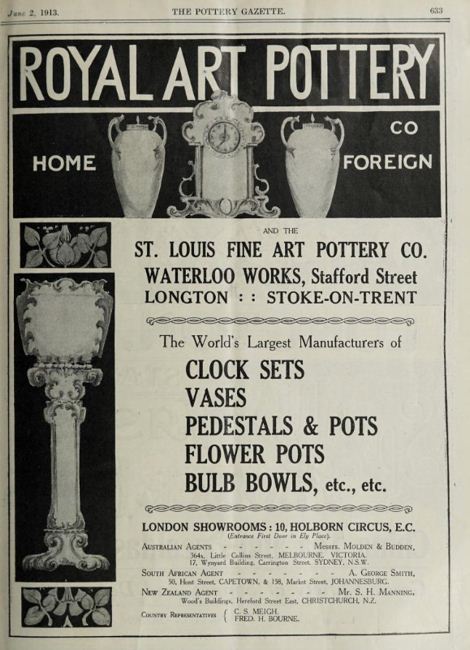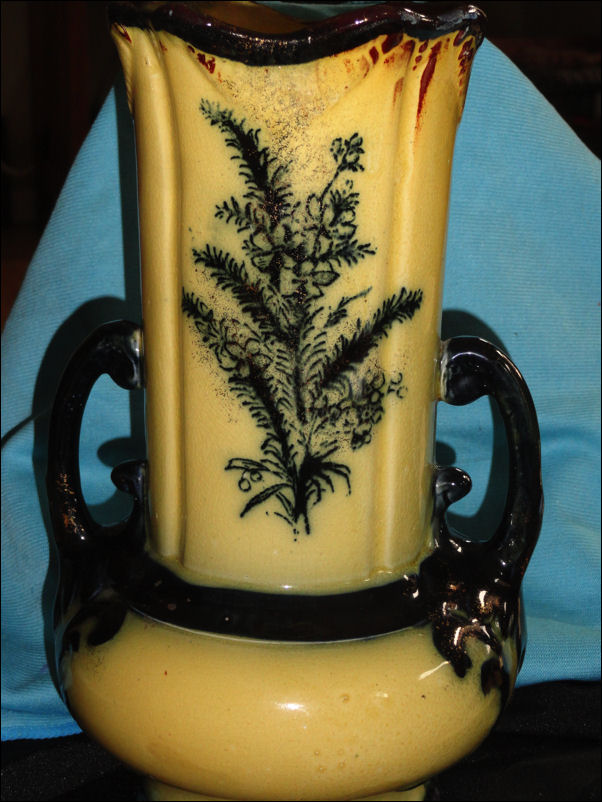![]()
|
Royal
Art Pottery Co |
Location and period of operation:
|
Royal Art
Pottery Co |
Longton |
1897 |
1915 |
Pottery manufacturer at the
Waterloo Pottery, Longton, Stoke-on-Trent, England
|
The London Gazette
28th December 1897

Notice of the dissolution of
the partnership
of the Royal Art Pottery

Royal Art Pottery Co.,
majolica and decorated
earth'ware manufacturers
from..... 1907
Staffordshire Sentinel
'Business Reference Guide to The Potteries, Newcastle & District'
The Pottery Gazette - September 1912

pattern
registration notice which shows that J.T. Fell and H. Aynsley
continued to trade as Art Pottery Co and also as St. Louis Fine Art Pottery
Co.
The Pottery Gazette - January 1906 |
 Royal Art Pottery Co. and the St. Louis Fine Art Pottery Co. Waterloo Works, Stafford Street, Longton, Stoke-on-Trent The Pottery Gazette - June 1913 |
|
The Royal Art Pottery Company, Waterloo Works, Longton, have just paid one of their periodical visits to London. Their Mr. C. H. Brittain had a large collection of samples on show at the Saracen’s Head, Snow-hill. The company are noted for their flower pots, vases, and pedestals and pots. In all these they have new forms and decorations for the coming season. The new shapes are interesting, but the best effects in the new samples are obtained from novel colour combinations. Several of these are of a daring character, and yet, the results are in every sense satisfactory. A range of flower pots has scenes from ancient Roman history depicted in heavy embossments round the body of the pot. These scenes are in light green, while the body of the piece is black. This dark ground, with light relief's is a happy combination. The same ornamentation is applied to vases, pedestals, and similar pieces. They call this "Hawinian" ware. Other colour combinations are shown on pots and other pieces, without embossments. For instance, some of the pieces have the lower portion blue and the upper half crimson—these are not shaded; they are solid self-colours, and depend upon contrast for their effects. Another new colour scheme consists of a free representation of a "Gibson Girl," with flowing robes. The figure is in light green, while the ground is dark. The same treatment of light and dark colour contrast is shown in other decorations. An up-to-date range of flower pots has farmyard and rural scenes in colours round the pots. Animals, figures, and farm buildings are variously introduced. The company are applying a pretty series of "Sunset" views to vases, pedestals and pots. The name indicates the character of the scenes, which are rich in "sunset" effects. Bright, warm crimson, gradually toned for "distance" effects is the predominant colour. The company have brought out several novelties in "Clock" sets. They are elegant in form and attractive in ornamentation. These sets are very suitable as presents, and dealers stocking them should occasionally label them as such. The Pottery Gazette - March 1906 |
Marks used on ware for identification:

Royal Art Pottery Co.
Longton
England

Vase by Royal Art Pottery Co.
[photo: Lisa Murry]
click for more information on the Waterloo Pottery
Questions, comments, contributions? email: Steve Birks